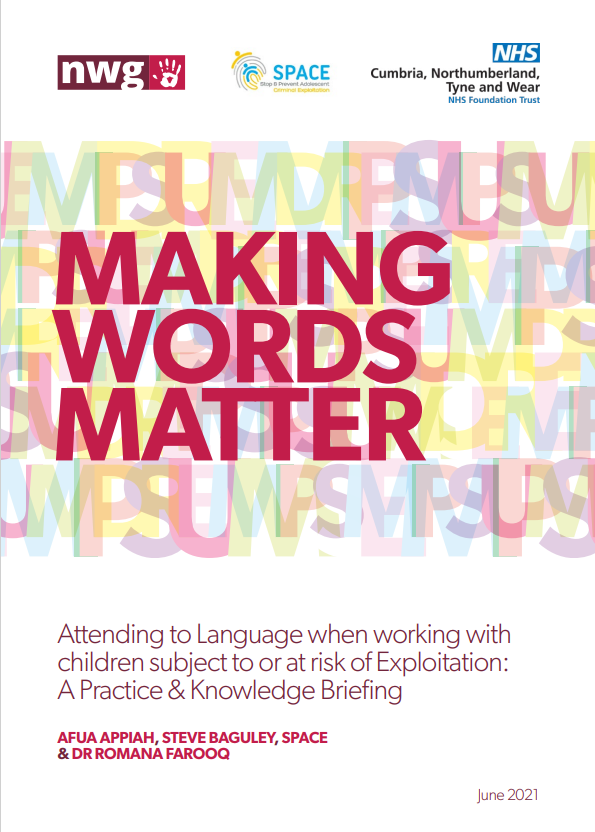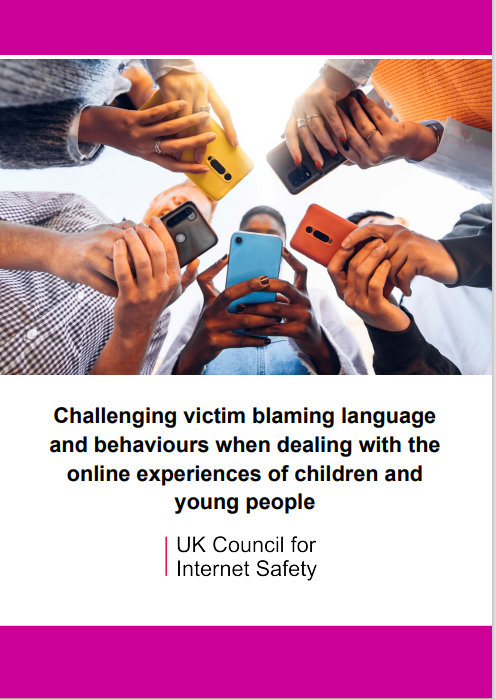Be Aware: Let’s talk about language

Tools for prompting discussion about our use of language around child exploitation.
Introduction:
In March 2023, North Yorkshire Safeguarding Children Partnership (NSCYP) updated its Multi-Agency Child Exploitation (MACE) and Contextual Safeguarding Strategy. The Strategy recognises that children and young people can be at risk of, or subjected to harm through exploitation and abuse from adults and/or other peers outside of their family network. Those who wish to exploit children often disempower parents/carers and young people themselves to further the control that they have over them. For this reason, professionals mustn’t facilitate this through using language that seeks to lay blame on either the child or parents/carers.
To promote the use of positive language across the partnership, a series of resources have been created to help practitioners consider the words and phrases that they may use when speaking to and about young people. It encourages consideration of the impact language can have on children and young people, as well as parents and carers affected by exploitation or other forms of extra-familial harm. This includes not just language used verbally, but information that is written in files, case notes, statements, assessments and reports.
This pack is a collation of key documents produced across the partnership; it is a tool to help prompt our discussions and reflections about our use of language and the impacts it can have.
We have also developed a series of multiagency principles around the use of language which have been produced for use across the partnership. It is envisaged that these will enable partners to regularly discuss the language used within their practice, supervisions/reflections and to encourage appropriate professional challenge where the language is inappropriate, harmful and requires reconsideration.
Whilst this pack has been developed with consideration of child exploitation and extra-familial harm, it can be used in consideration of any of the language we use with young people and families. Whilst professionals invariably do not set out to use language that can cause harm, continued awareness of how the language we use shapes the narratives young people have of themselves and others around them is crucial. We don’t always get it right, but these principles are a commitment across our multi-agency partnership about how we will be cognisant of the need to use non-victim-blaming language in our meetings, communications and engagements with other professionals, children and their families.
Multi-agency principles around the use of language.
Within our roles, we have the privileged position to know and work with children, young people, families and vulnerable people. Our language and how it is interpreted can shape the narrative of these individuals’ lives so we have a duty to present our language in the most accurate and person-focused way. Therefore as a partnership, we are committing to these principles for how we are using language.
- Professionals will be guided by children, young people, vulnerable people and families when establishing terminology they are comfortable for professionals to be using. There may be times when individuals use inappropriate language and we will encourage them to consider informed terms for their experiences. We will seek to avoid complicated jargon that can have negative impacts on how individuals engage with our services. Avoiding this jargon is vital for ensuring all our agencies understand each other.
- We understand how language can shape other professionals’ viewpoints of young people; so are dedicated to be child-focused and trauma-informed in all communications regarding children, young people, vulnerable adults and families we will consider how all this communication would be interpreted by those individuals.
- Our network is committed to using the agreed terminologies identified for each child, young or vulnerable person or family. This means we will confidently challenge any other professionals using problematic language. We acknowledge that appropriate language is constantly changing and will be guided by colleagues on using appropriate terminology. As well as challenging colleagues, we will challenge ourselves to ask critical questions to put service users at the heart of all language.
- Each organisation within the partnership is dedicated to continually striving for professionals to be aware of the culture of language and the impacts professional language can have on our communities. In practice this means; discussing within supervisions, reflecting on practice, formal feedback and other processes feeding into professionals’ best practices.
This document can be used as a tool to prompt discussion, conversation and reflection; either as a team, through peer discussion or supervision, or your own reflective practice. It is an opportunity to challenge yourself and those around you about the use of language and the impacts it can have. Additional documents and resources have been attached at the end; these contain further reading and examples of language; its implications and suggestions for reframing.
· Has there ever been a time when negative or inappropriate language has been used about you? How did it make you feel? What impact did it have?
· Can you think of any examples you have seen/heard where negative or inappropriate language has been used when working with young people and families? Did that language have an impact on how that young person or family was perceived by others? How do you think that language made them feel?
· How confident would you feel in challenging the use of inappropriate language from another professional?
· Looking through the commitment principals as a team, or individually through peer discussion or supervision? How confident do you feel that these principles are adhered to in practice across your partnership working?
· How would it feel to the parent or young person if they were to see/hear the language that had been used to describe their lives?
· What more do we need to know about the child, young person, family or vulnerable adult historically and contextually to increase our understanding of their behaviour?
· Does this language only consider a single story or perspective about the young person and how can other viewpoints be explored?
· What does the use of this language imply about the relationships around the young person?
· How would other professionals interpret what had been said/written if you weren’t there to explain it in context?
· How can our use of language encourage a shared responsibility of support without blame?
What does the young person want to achieve and what would their next steps be?
Additional documents and resources:
The Children’s Society Child Exploitation Language Guide:
The Children’s Society have produced a webpage and PDF guide to support taking positive steps to eradicating victim-blaming language.
The documents can be accessed here:
Webpage: Child Exploitation Language Guide | The Children’s Society
PDF Guide: Appropriate Language Guide Final (English).pdf
To access the supporting documents and resources go to the Hydrant or NAPAC webpage.
Additional Resources
Page reviewed: January 2025








 View all our news
View all our news